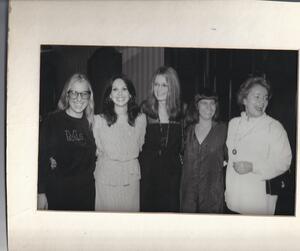Deborah, Golda, Letty, and Me: Being Female and Jewish in 2013
As a feminist, a Jew, and a sometimes-writer, I should have had Letty Cottin Pogrebin on my top 10 list of awesome people I’d love to have dinner with someday. I can’t believe that I didn’t know about this incredible writer-activist until this summer, when I began working at the New Center for Arts and Culture. As soon as I heard that Letty co-founded Ms. magazine, her New Center program quickly became my most highly anticipated of our fall season. And I realized that I needed to know more about her than what my quick online search produced.
While I knew her New Center discussion with Robin Young would focus on her latest book, How to Be a Friend to a Friend Who’s Sick, I decided to start with her seminal work, Deborah, Golda, and Me: Being Female and Jewish in America. Published in the early 1990s, I couldn’t help but read her book with a bit of curiosity: how far (or not) have things come for us as women and Jews in America, over 20 years later? And, how can we further adopt Letty’s ideas and practices? For too long, I’ve been frustrated that many in my generation see feminism as a dirty word, and that we don’t recognize the struggles of women before us that have allowed us advantages we take for granted. Reading about Letty’s life and work has been a catalyst for how I think about my own feminism and Jewish identity.
Letty’s passionate writing covers everything from her religious upbringing to her disillusionment with and subsequent re-entry into practicing the Jewish faith, biblical female figures, and Hollywood’s portrayal of Jewish women. But, in my opinion, the two most compelling issues she explores include the role of women in Judaism and her experience with anti-Semitism in the feminist community—and what she’s done to better these obstacles.
Raised as a Reform Jewish woman, I rarely if ever felt left out of my faith because of my gender…and this was thanks to the efforts of those before me. My commitment to creating inclusive, egalitarian communities strengthened when reading about Letty’s ad-hoc High Holiday services on Fire Island, feminist seders, and experiences with the Women of the Wall. In strange way, while reading this book I felt like I was having a conversation with Letty in my head, questioning whether or not her tool to overcome prejudice and misunderstanding—conversations among women of different backgrounds—would still work as well today.
My answer? Yes. Letty advocates for peaceful change, and champions dialogue groups to promote better understanding. In fact, she has been meeting with a Black-Jewish women’s group for many years, in addition to a Palestinian-Jewish one. The difference is that I think today, we need to discuss gender equality in a gender-equal setting. The sisterhood needs the brotherhood to fully come on board. Letty notes this, when writing about how she and her husband read books on gender roles and discussed how to raise a family without those stereotypes (and she clearly succeeded, given her accomplished career).
I don’t fully understand women my age who don’t like to label themselves as feminists. But I suspect they think the negative connotation will repel others, particularly men. I want to change that. I want a new norm: that instead of laughing off the term feminist, we need to actively seek out men who label themselves as such. I’m starting a feminist dialogue group in Boston that is open to all genders, and I hope others will do or have done the same (and if you have, I’d love to hear how it’s worked for you; please leave a comment!). Letty’s frankness reminds me that we need to make ourselves vulnerable in order to grow. The future of an inclusive Judaism depends on our own creativity and willingness to engage with one another, and those who are different. We can reshape and redefine our traditions so that they carry greater meaning in the 21st century for Jews of all backgrounds and genders.
In the end, reading Letty’s story and reflections made me realize: we’ve come a long way, and we have even further to go. It’s up to us to keep the dialogue going and continue to sustain the legacy that women like Letty Cottin Pogrebin have left for us.
The New Center will present Letty Cottin Pogrebin in conversation with Robin Young at Temple Isaiah in Lexington on Thursday, October 24th at 7:30 p.m. For tickets and more information, call 617-531-4610 or visit www.newcenterboston.org.







Sara, Can't thank you enough for this wonderfully flattering piece. Best of all, I'm thrilled to know that you exist, that you're engaged in the feminist struggle, and that you represent a larger constituency of committed, autonomous, justice-seeking young Jewish women. Best, Letty